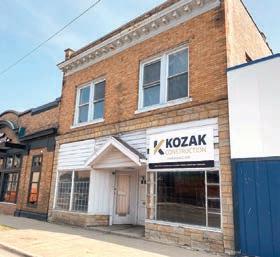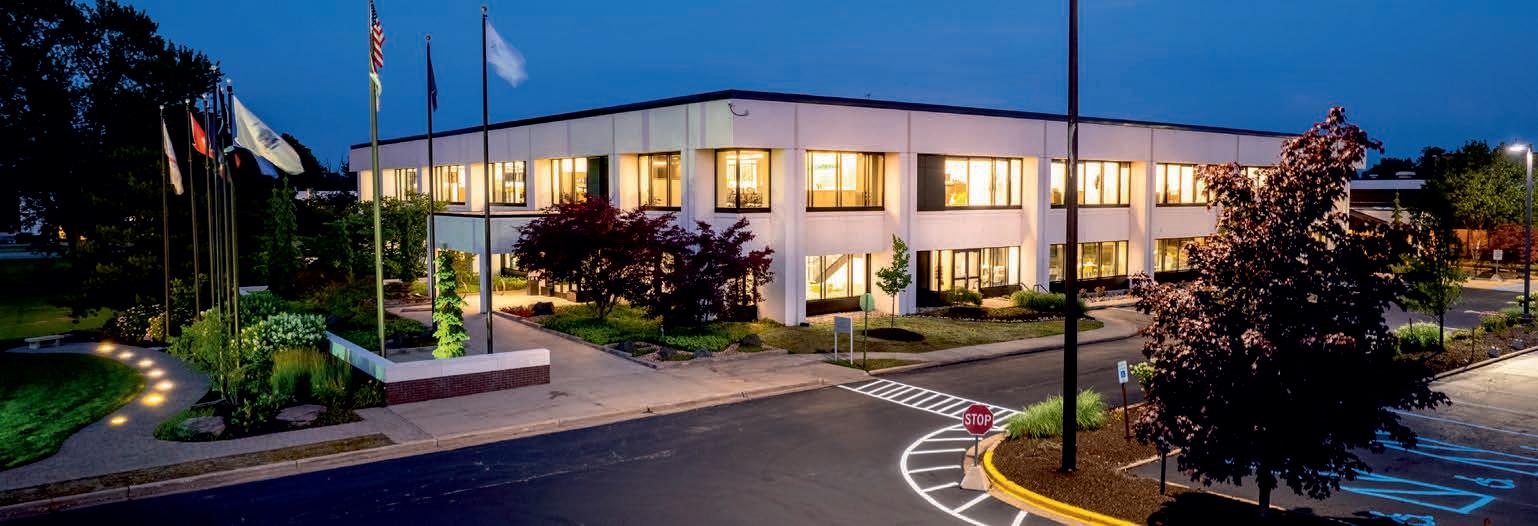IS THE MOTHER OF AUTOMATION
 By Kayleigh Van Wyk
By Kayleigh Van Wyk
Walker-based HS Inc. was founded in 1969 as a tool and die maker, specializing in injection mold design and manufacturing.

e legacy business line suited HS Inc. well for decades. More recently, though, HS Inc.’s tool and die segment was exposed to market disruptions and uncertainty, forcing company executives to make a strategic decision earlier this year to focus solely on automation solutions.
For President Dale Hermiller, it was a “bittersweet decision” to transition away from the company’s origins.
“We were founded on tool and die, but we had a severe drop-o
brings HQ
platform that allows consumers and small businesses, primarily sole proprietors, to access credit based on cash ow, rather than a credit score that may have been hurt by high medical debt or another life event, for example.
By Mark SanchezGrain Technologies Inc. will use the $500,000 investment it received from the New Community Transformation Fund to help the Oakland, Calif.-based ntech shift to a business-to-business model.
As part of the investment by the Grand Rapids-based New Community Transformation Fund that invests in second-stage minority-owned companies, Grain Technologies plans to relocate its corporate o ce from Oakland to Grand Rapids.
Grain Technologies created an app-based credit underwriting
e six-year-old company sought to “democratize access to credit” and “allow people to manage their credit more responsibly” when buying goods and services, co-founder and CEO Christian-Robert Joseph told Crain’s Grand Rapids Business.

“As victims of the narrow credit system structure, we weren’t included in deserved opportunities and experienced large amounts of high-interest debt. Our product reimagines how credit decisions are made and widens possibilities for businesses and consumers,” Joseph said.
in workload and available work in that space,” Hermiller said.
“We tried many strategic initiatives to make it through to the other side where the work would pick back up, which forecasts were telling us was going to be
the rst quarter of 2024, maybe the last quarter of 2023. But at that point, with the competition and the pricing … it was getting more and more di cult to be successful in that area. Being diversi ed gave us an opportunity to focus on a new strategic direction.”
By Kate CarlsonLocal developer Bradley Veneklase aims to replicate the success of a downtown boutique hotel by bringing a similar concept to the bustling Bridge Street corridor on Grand Rapids’ west side.

Veneklase is behind e Finnley, a micro-hotel that opened two years ago in the former National Bank building on Monroe Center Street.
His latest plan, called e Blue Jay, would introduce lodging to the Bridge Street corridor and in-
clude ve rooms, a shared lounge and bar area, as well as an outdoor courtyard with re pits and lawn games for guests, Veneklase said. e hotel would

are adapting to a shrinking labor forceJR Automation last year announced a $9.9 million expansion to add capacity and 140 jobs. LAKESHORE ADVANTAGE CORP.
Together,











Tech firm boosts employee-ownership model
After founder’s retirement, Atomic Object follows unusual transition path
By Kayleigh Van WykGrand Rapids-based software company Atomic Object LLC boosted its employee ownership plan with a recent equity sale led by company executives, the first sale since company founder Carl Erickson has transitioned to retirement.

Co-CEOs Shawn Crowley and Mike Marsiglia in April sold 10% of their own equity in the sale to Atomic employees. As a result, 16 employees opted to buy equity,
and now more than half of the company’s 95 workers own part of the company, with non-CEOs owning about 65% of the firm.
The sale occurred as part of the company’s non-employee stock ownership plan. Unlike other employee-owned companies, Atomic does not operate a traditional ESOP with ownership through retirement accounts. Instead, Atomic’s profits are distributed to owners as quarterly dividends.
Erickson launched the plan in 2009 after spending a couple of
years investigating options. He said he rejected the expensive and complicated ESOP structure in part because of the young ages of his employees.
“At the time, most of my colleagues were in their 20s or maybe early 30s, so putting a retirement plan in place did not seem terribly motivating,” Erickson said. “I wanted to match what I saw as de facto ownership with actual legal ownership, and ESOP doesn’t do
Developer closes
on Celebration Village’s last property
Three-acre parcel will have residential and retail components
By Kate CarlsonA local firm has closed on the last developable property in Grand Rapids’ Celebration Village, opening plans for a mixeduse project on the city’s northeast side with 240 apartments and 10,000 square feet of retail.
Planners OK key parts of amphitheater amid concerns
Residents question parking availability and noise levels in surrounding area | KATE CARLSON
The Grand Rapids Planning Commission has approved various amenities and primary functions associated with a 12,000-capacity amphitheater planned along the Grand River.

At its June 22 meeting, planning commissioners approved a special land use application for the outdoor amphitheater venue and associated events, alcohol service, a streetside plaza, mobile food vending and outdoor activities.
The site design also includes a 116-space parking lot and 50 feet on the perimeter along the river that would remain under city ownership to allow public access.
Grand Rapids Planning Director Kristin Turkelson said the city
is considering the amphitheater application similarly to how it did the Downtown Market to allow flexibility in uses.
son said.
The agreements mark the first in what will likely be a series of forthcoming approvals and con-
Victory Development Group last month closed on the 3-acre property located at 2160 Celebration Drive NE, clearing the way for the roughly $50 million project. Company officials declined to disclose the sale price.
Celebration Village is anchored by the Celebration Cinema GR North movie theater. The area, commonly referred to as Knapp’s Corner, contains several major retailers and chain restaurants, including a Meijer store, Melting Pot, HopCat, IHOP, Panera Bread and ALDI.
“The specificity by which the planning commission traditionally reviews an application is a little bit challenging when we have a project like this,” Turkel-
siderations for the project backed by Grand Action 2.0.
The city will continue to examine the need for a full traffic study based on future phases of the de-
velopment, according to a planning staff report on the project.
Separately, the Michigan Department of Transportation (MDOT) will need to sign off on development plans because of the site’s close proximity to U.S. 131.
Meanwhile, the amphitheater is part of a broader mixed-use vision for more than 30 acres along the Grand River that include both publicly and privately owned parcels. According to Grand Action 2.0, future phases of the riverfront could include several mixed-use buildings with up to 1,500-1,700 housing units.
Grand Action 2.0 is the lead
“We felt like this space was the best 3 acres in all of Grand Rapids to develop housing,” said Brad Laackman, a partner at Grand Rapids-based Victory Development Group and CEO of Honor Construction. “We find it’s a five-minute, walkable neighborhood that really has everything besides the housing aspect, including grocery stores, retail and the movie theater. This development will really be the anchor that finishes the idea of Celebration Village.”
The residential portion of the development will include a mix of studios, one-, two- and three-bedroom units. Rent prices have not
“The core of the amphitheater (design) is very technical, but with some of these amenity buildings on the periphery, we have the opportunity to allow that community to shape those interactions.”
Bill Culhane, principal at Progressive AE
‘Scandinavian modern’ home boasts city views for $1M
which was officially established in 1926 but contains houses dating to 1874. Rosendall said he was inspired to tackle all four projects after trips to the Washington Park neighborhood of Denver.
By Rachel WatsonA contemporary home in one of Grand Rapids’ historic neighborhoods offers skyline views of Grand Rapids just up the hill from Medical Mile.

The two-story, 2,398-squarefoot home built in 2019 at 14 Trowbridge St. NE in Grand Rapids’ Belknap Lookout neighborhood hit the market recently for $1 million.

Listed by Kellie Kalish, associate broker for Engel & Völkers Shoreline in Grand Rapids, the home is currently owned by Corey Landacre, a certified registered nurse anesthetist who moved away for a job in New Mexico last year.
Landacre has a background in real estate as a former agent with Grand Rapids-based CopperRock Real Estate, affiliated with CopperRock Construction, the firm that built the home.
The price for the three-bed, twoand-a-half bath home is set at $368 per square foot, which is in line with the price of $1,055,000 ($417 per square foot) that CopperRock’s other luxury build at 3 Trowbridge St. NE sold for in 2020.


‘European upside down’
Landacre declined to be interviewed for this feature. Dean Rosendall, president of CopperRock Construction, worked on the home and said along with 3 Trowbridge, this is the only dwelling he knows of in Grand Rapids built in this style.
He refers to the architectural design as “Scandinavian modern” because of the exterior hardwood feature on one corner of the home, the boxy shape and the single-slope roof.
The layout is called “European upside down,” because the main living area, kitchen and master suite are on the second floor to afford better city views, while the other two bedrooms are on the ground floor with garden views.
“The whole interior pitch of the (14-foot, second floor) ceiling is designed to direct you to the city views and sunsets,” Rosendall said.
In addition to building this home and 3 Trowbridge, Rosendall said CopperRock also “saved” and rehabilitated two historic homes in the neighborhood,
“They’ve done a really nice job of saving good, older homes (in) really nice rehabs, and then … there’s a lot of modern architecture. So, you’ll see an 80-year-old home redone next to a very modern, brandnew build, and I just found that a lot of people enjoyed going around and looking at the homes there, and I thought this was an opportunity to do something like that,” he said.
Rosendall said some of his favorite features of the home include the heated floors in the primary suite and lower entryway and the elevated balcony deck off the living room.
He added that the home was designed to accommodate a chair lift from the first to second floor to make the home fully accessible to wheelchair users, should a future owner choose to add one.
Amenities
Kalish, the listing agent, said her favorite amenities in the home include the Jenn-Air kitchen appliances; “pot filler” spigot above the range, which also has a food warmer; a wine cooler under the counter; gas fireplace in the living room; large windows with electronic shades; and gorgeous city views from both the living room and master bedroom.
She also likes the additional privacy provided by the fact that none of the windows face the street.
The main suite includes a walkin closet with custom shelving and a full-sized stacked Maytag washer and dryer. Its primary bath features a double-sink floating vanity and herringbone-patterned tile
walk-in shower with hand-held, angled and rain spout shower heads.
The lower level has a mudroom with built-in coat and shoe storage; a full bath; and a large flex space that could be made into a second living room, gym, office or rec room.
Kalish said it also would not be difficult to reconfigure the lower level to add a fourth bedroom that would connect to the bathroom as an en suite.
Outside are eight parking spaces with the potential for a ninth — three on the right side of the house, two in the driveway apron, plus a three-car garage that could become a four-car with the addition of a vehicle lift in the 12-foot ceiling.
“I think a lot of times, when people picture moving into the city, their first thought is, ‘We’re not going to have enough places to park or whatever when we entertain,’” Kalish said. “It’s unique in that it’s in the city, but it has so many parking options for such a small footprint.”
The house also has a private fenced-in backyard for kids or pets.
“To have those types of amenities in a new build, single-family home (near downtown) is very rare,” Kalish said.
Location
Kalish praised the “killer location” just up the hill from Medical Mile.
“It could appeal to a lot of different people, but I think the obvious (fit) would be anyone working on the Medical Mile because it’s so close,” she said. “Also, with the new
Corewell Health Center for Transformation and Innovation going in at the bottom of the hill, there may be an executive there who would appreciate the walkability.”
The Belknap neighborhood also offers four parks — Lookout, Coit, Reservoir and Belknap — and it’s near downtown, the riverfront and the I-196 highway connection off College Avenue.
“It’s just a unique opportunity,” Kalish said. “I feel like this is a phenomenal deal to be so close to downtown and to have the views. For $1 million, you wouldn’t be able to get that in many other places.”
Presence near city’s Medical Mile could appeal to many
“The whole interior pitch of the (14-foot, second floor) ceiling is designed to direct you to the city views and sunsets.”
—Dean Rosendall, president of CopperRock ConstructionThis home built in 2019 at 14 Trowbridge St. NE in Grand Rapids’ Belknap Lookout neighborhood hit the market for $1 million. | BRIAN MCDONALD PHOTOGRAPHY
WORLD-CLASS TALENT. BUILT IN MICHIGAN.
MICHIGAN
PURE OPPORTUNITY ®




The right workforce is everything. At MEDC, we connect your business to services and partners across the state to attract, train and upskill the talent you need to get ahead. It’s how Michigan companies grow their world-class teams of tradesmen and engineers. Seize your opportunity at MICHIGANBUSINESS.ORG













Named Best Bank by Newsweek


3 Years in a row!
Health system forms portal to track DEI among suppliers, vendors
University of Michigan Health-West buys

$250 million in goods and services annually









 By Mark Sanchez
By Mark Sanchez







University of Michigan HealthWest plans to better track diversity among suppliers and vendors through a new procurement initiative.

The health system contracted with Dallas-based analytics and advisory firm Vizient Inc. for a portal that tracks and documents data that will ensure it has and maintains a diverse supply base. The goal is to make sure the organization’s base of vendors, suppliers and contractors reflect the market’s changing demographics.
“It allows us to create more opportunities for people to become a supplier to the hospital. Even beyond that, we’re asking our existing suppliers to at least document their commitment to the DEI principles because we think that corporations that work with us are part of our team and want them to at least share our values,” said Greg Meyer, chief community officer at University of Michigan Health-West.
Debora

“It’s morally correct and it’s economically important because our demographics are changing. We need to be inclusive so that the people that serve us are treated the same. To me, it just makes simple sense,” Meyer said. “It just reflects us wanting to be inclusive so that everyone has an opportunity. By having the data, you can look and see where you can improve. That’s good for us (and) it’s good for our community.”
University of Michigan HealthWest buys $250 million in goods and services annually from more than 10,000 vendors, contractors and suppliers, ranging from medical equipment, supplies and drugs, to landscaping and other professional services.

The data from the portal will show whether the health system’s procurement is aptly reaching out to businesses that could become a supplier, Meyer said.
Findings from the portal will show whether the system is “actually advertising to those businesses” and “if we’re not getting a significant increase in that supplier diversity, then what do we need to do differently?” Meyer said.
“Do we need to market differently? Do we need to advertise in different places?” he said. “This is the first step to be able to gather that data to see how we can do better in the future.”
University of Michigan HealthWest considers a diverse supplier a business that’s 51% or more







owned, controlled and operated by people of color, women, LGBTQIA+ individuals, individuals with disabilities, people who are socially and economically disadvantaged, or U.S. military veterans.



“We know that having a diverse supplier base is essential to achieving our DEI goals, and we are committed to supporting underrepresented groups and providing equal opportunities for all,” said President and CEO Dr. Peter Hahn. “We are dedicated to upholding this principle and ensuring that our suppliers align with our commitment.”

The health system’s move to tracking supplier and vendor diversity started more than three years ago with an internal assessment that looked at “where we were” on DEI and considered staff
diversity and recruitment, retention and training, Meyer said. The assessment showed “that we had a lot to do,” including improved staff training and education in areas such as implicit bias and cultural intelligence.
The assessment also led to launching the effort to track progress on diversity within the health system’s supply base and vendors, he said.
University of Michigan HealthWest has no specific goals for how diverse of a supply base it wants, “but what we can do is to create a fair process for everybody and encourage those suppliers to actually make the attempt to join us and be part of supplying those services and products that we need,” Meyer said.
As the portal gets used and generates data, the health system intends to set targets based on a DEI strategic plan and establish metrics for evaluating the initiative’s success.
“Our goal is to make sure that everyone has an equal chance at being a supplier to the hospital,” Meyer said. “The measurement will be, are we increasing the applicants for those services within that community? Are we getting people trying to get work from us?”

Wildfires provide key data for startup tracking air pollution
JustAir Solutions drills down to neighborhood level for monitoring
 By Kate Carlson
By Kate Carlson
As unhealthy air quality levels enveloped the state late last month, users of entrepreneur Darren Riley’s JustAir app in Grand Rapids and Detroit received alerts about the air pollution around them, along with tips to decrease exposure.
Riley’s effort a few years ago to raise awareness about localized air pollution in communities of color via his startup, JustAir Solutions Inc., took on greater significance recently as Canadian wildfire smoke covered Midwest cities.
Longer term, data collected over that period will provide important insights to JustAir’s environmental justice work and advocating for clean air in neighborhoods combatting localized air pollution on a daily basis.
Founded in 2021, JustAir Solutions has deployed several air quality monitors throughout the cities of Grand Rapids, Detroit and Waterbury, Conn., compiling air quality data for people to track through JustAir’s website and mobile app. JustAir is also collaborating with community groups in Kalamazoo, Dearborn and Colorado’s Department of Transportation to identify locations to install monitors and track air quality throughout each community.
The company was started to provide accurate air quality readings at the neighborhood level, with a key focus on equity as urban air pollution disproportionately affects people of color.
“Because of the smoke from the wildfires, everyone has been feeling air quality effects (in Michigan), but some people feel these effects on a granular scale outside of these regional events,” said Riley, JustAir’s CEO and co-founder, referring to communities that struggle with localized air pollution on an ongoing basis. “We want to make sure everyone has access to that information and has tools they need to reduce exposure.”
The Michigan Department of Environment, Great Lakes and Energy (EGLE) extended a statewide air quality alert through multiple times at the end of June because of the smoke from wildfires in Canada.
Air quality levels in Grand Rapids and Detroit reached the “very unhealthy” level at some points during that period, prompting event closures across the state.
Michigan on numerous occasions has been affected by wildfire smoke, though it typically has drifted into the upper atmosphere by the time it reaches Michigan, said Alec Kownacki, meteorologist at EGLE.
“Smoke has always been impacting Michigan, but it’s always been way up in the atmosphere — it’s been from way out west usually. But these fires (in Canada) are much closer to us now, so the smoke is closer to the ground when it reaches us,” Kownacki said.
Riley noted that outside of regional air quality events such as the wildfires that affect everyone,
people of color are more likely to live in communities with poor air quality. These residents are more likely to be exposed to negative long-term health effects that come with poor air quality, said Riley.
“Everyone is feeling this pain right now, but I can point to weeks and days of certain (JustAir) monitor readings where there was poor air quality because of where they were located. But that doesn’t get captured by the state and you won’t know that unless you’re signed up for those neighborhood air quality sensor updates,” Riley said.
JustAir recently installed seven new air quality monitors in Grand Rapids’ 49507 ZIP code, which has the largest population of people of color in the city.
The monitors in the 49507 ZIP code were recently installed, but JustAir for about two years has operated other monitors in the Madison Square neighborhood, downtown and along the Cesar E. Chavez Avenue corridor, Riley said. The data collected so far show disparities along the Cesar E. Chavez Avenue corridor, likely because of truck traffic, he said.
State and local governments lack the operational bandwidth to operate more air quality monitors to track the issue on such a granular scale, Riley said. That’s where JustAir aims to fill in gaps and bring
attention to the tracking issues. Michigan has more than 40 air quality monitoring locations that EGLE tracks with more than 100 air monitors, according to EGLE’s website. Grand Rapids has three or four monitors and Detroit has five or six, Kownacki said.
However, Riley is concerned as city neighborhoods and pockets can register a yellow-zone or “moderate” air quality level for weeks while other areas in a city regularly have healthy air quality levels. Regular exposure to moderate-quality air could contribute to long-term negative health effects, Riley said.
To attract better talent, you need better benefits. Blue Cross is ready to help your business stand out with affordable whole health coverage and convenient care for everything from behavioral health and virtual care to maternity and menopause. Plus, with one of the largest networks of doctors and hospitals in Michigan, you’ve got the coverage you need wherever you go.
For the coverage employees want and businesses can trust, we’re ready to help. bcbsm.com/employers

business is caring for yours.JustAir Solutions’ air quality monitors in Grand Rapids. COURTESY OF JUSTAIR SOLUTIONS
CRAIN’S LIST TOP AREA BREWERIES/BREW PUBS
Ranked by number of barrels produced in 2022
New Holland Brewing 684 Commerce Court Holland 49424 p (616) 355-6422
newhollandbrew.com
Perrin Brewing Company
5910 Comstock Park Drive Comstock Park 49321 p (616) 551-1957
perrinbrewing.com
Big Lake Brewing
13 West Seventh St. Holland 49423 p (616) 796-8888
facebook.com/biglakebrewing
Brewery Vivant 925 Cherry St. SE Grand Rapids 49506 p (616) 719-1604 breweryvivant.com
Ludington Bay Brewing Company 515 S. James St. Ludington 49431 p (231) 239-6690 ludingtonbaybrewing.com
The Mitten Brewing Co.
527 Leonard St. NW Grand Rapids 49504 p (616) 608-5612 mittenbrewing.com
Harmony Brewing 1551 Lake Drive SE Grand Rapids 49506 p (616) 459-9333 harmonybeer.com
City Built Brewing Co. 820 Monroe Ave. NW, Suite 155 Grand Rapids 49503 p (616) 805-5755 citybuiltbrewing.com
Cedar Springs Brewing Company 95 N. Main Cedar Springs 49319 p (616) 696-2337 csbrew.com
BOB's Brewery 20 Monroe Ave. NW Grand Rapids 49503 p (616) 356-2000 f 493-2011 thebobsbrewery.com
Third Nature Brewing
7733 Childsdale Ave. NE Rockford 49341 p (989) 289-3077
thirdnaturebrewing.com
Owner(s)Head brewer Year established 2022 revenue
No. of barrels produced in 2022Food served Popular brands
Brett VanderKamp Jason Salas1997DND51,000American fare with seasonal menu rotations; full bar service Dragon's Milk Bourbon Barrel Stout, Tangerine Space Machine NE IPA, The Poet Oatmeal Stout
CANarchy Collective Connor Klopcic
2012DND11,000Full menu
Travis PrueterZach Dreyer2013$3.9M3,900Yes
Jason Spaulding Kris Spaulding Jacob Derylo2010DND3,000From scratch menu influenced from European countryside cooking like duck confit nachos, Vivant house ground burger, traditional bone marrow, small producer cheeses, escargot and rotating in season entrées sourced from local farms
Ted GedraCorey Wentworth
2015DND2,042Full menu, traditional/American cuisine
Seating capacity
400 in Holland, 800 in Grand Rapids
Black, 59-10 IPA, Grapefruit IPA and No Rules 250
Blood Orange Haze IPA, Michigan Amber, Sparti Parti, Haze & Blue 240
Wizard Burial Ground-bourbon-aged quad, Farm Hand farmhouse ale, Rapid IPA-modern American style IPA, Grand Lager-crushable beer that tastes like beer
D’Booty, First Curve, Tangelo Dream, Lake Phantom, 9 Wt., S.S. Badger Blue, Summer Fling, Ry-Fi, Vanilla Jitterbean
145 inside and 60 outside
Max Trierweiler Chris Andrus Miguel Munoz Jeff Williams Matt Ross
Barry Van Dyke Jackson Van Dyke Heather Van Dyke-Titus
2012$3.65M1,820Pizzas, appetizers/snacks, sandwiches, salad Country Strong, Triple Crown Brown, Peanuts and Crackerjack, Mango Gold, Fogout
76 indoor, 88 outdoor (seasonal), 38 private
250
Andrew Carson 2012$3.02M870Pizza, appetizers/snacks,Black Squirrel, Fiddlestix IPA, Crossroads Rye Pale Ale 250 in Eastown
Edwin CollazoPatrick Lynch2017$1.8M850Puerto Rican Inspired Prague Underground, Werewolves of Michigan, Baby Series 140
David RinglerMatt Peterson2013$2.2M650Full menu
Küsterer Original Weissbier, Küsterer Salzburger Märzen, Outdoorsman, Eire
Gilmore Collection John Svoboda1997DND600Multiple restaurants, varied menusIPA, stouts, seasonal, one-offs, barrel aged, Peanut Butter Porter
Hayley Zitzelsberger
Troy
Zitzelsberger
Lisa Roebke
Bryce Roebke
Bryce & Lisa
Roebke
Troy & Donghee
Zitzelsberger
Troy
Zitzelsberger
150 winter, 230 summer
2,000
2018DND600Full menu, it's delicious 3NEIPA, White Pine Pils, El Hefe, Jeju IPA A few hundred during the summer with our biergarten
Archival Brewing 6266 West River Drive NE
Belmont 49306
p (616) 278-3194
archivalbrewing.com
Broad Leaf Brewery & Spirits 2885 Lake Eastbrook Blvd.
Kentwood 49512
p (616) 803-0602
broadleafbeer.com
Levi Knoll
Callee Knoll Jake Steele Dave Massey
2021$1.5M475Full menu Fritz's Folly, Kranz Kolsch, Cloud Piercer, The Duke Says Nein 300
Jason Spaulding Kris Spaulding Terry Lancaster
2019DND 394Street food style
Chromatic Shatter, Sour Lake100
lists are also available.





CRAIN’S LIST TOP AREA BREWERIES/BREW PUBS

Grand Rapids Business list of top area breweries/brew pubs, ranked by number of barrels produced in 2022, is the most comprehensive available. This list includes a larger portion of the state.
Grand Rapids Business surveyed 59 breweries/brew pubs, 19 responded and 19 are listed. To be considered for future lists, email
LIST STORE: Download this list now at crainsgrandrapids.com in Excel or PDF format. | The Book of Lists and other lists are also available.





Chicago Drive
49426

(616) 662-4589 f 662-5473



Crain's Grand Rapids Business list of top area wineries and cider mills, ranked by number of gallons produced in 2022, is the most comprehensive available. This list includes a larger portion of the state. Crain's Grand Rapids Business surveyed 25 wineries and cider mills, 7 responded and 6 are listed. To be considered for future lists, email danielle.nelson@crain.com. DND = Did not disclose

49321 p (616) 888-9746

bierdistillery.com
Long Road Distillers
537 Leonard St. NW Grand Rapids 49504 p (616) 450-5649

longroaddistillers.com

New Holland Brewing
684 Commerce Court Holland 49424 p (616) 355-6422 newhollandbrew.com
Wonderland Spirits
2217 Lemuel St. Muskegon 49444 p (231) 788-9777 wonderlanddistillilng.com
Joel BierlingJoel Bierling2013DNDDND Full menu Heart Cut Vodka, Devil's Message Rum, Mum's Ruin Gin, Sole Cry Rye Whiskey, JusttheShine Moonshine, Henry's Absent Absinthe Verte, Crescent Creek Bourbon, Brillari Amaro, Forbidden Apple Brandy, Niagara Brandy
Jon O'Connor Kyle Van Strien Sydney Cannarozzi Peter Witkowski
Brett VanderKampBrad Kamphuis
Mark Gongalski Allen Serio
Zack Nolling
2014DNDDND
Full menu, appetizers, share plates, soups, salads, sandwiches


Canned ready to drink cocktails, Vodka, gin, MICHIGIN, aquavit, wheat whiskey, bourbon, malt whiskey, rye whiskey, nocino
DND
2005DNDDND
American fare with seasonal menu rotations; full bar service
Dragon's Milk Bourbon Barrel Stout, Tangerine Space Machine NE IPA, The Poet Oatmeal Stout
DND
DND2019DNDDND
Full menu, appetizers, snacks, sharables, wraps, pizza
Wonderland Cask Strength Blend of Straight Whiskeys, Wonderland Gin, Wonderland Single Malt Whiskey Aged in Apple Brandy Barrels, Wonderland Amaro-Finished BarrelAged Gin
200
Crain's Grand Rapids Business list of top area distilleries, ranked by number of proof gallons produced in 2022, is the most comprehensive available. This list includes a larger portion of the state. Crain's Grand Rapids Business surveyed 13 distilleries, 6 responded and 6 are listed. To be considered for future lists, email danielle.nelson@crain.com. DND = Did not disclose
CRAIN’S LIST TOP AREA MEETING AND CONVENTION VENUES
Ranked by 2022 total number of meetings/events hosted
GVSU - Pew & Health Grand Rapids Campuses 301 W. Fulton St. Grand Rapids 49504 p (616) 331-6620 gvsu.edu/meetatgvsu
CMP-certified event planners, fullservice food and beverage, alcohol service, complimentary parking, certified green venue, ADA compliant, teleconferencing, audiovisual, executive boardroom, complimentary wireless internet
Frederik Meijer Gardens & Sculpture Park 1000 East Beltline Ave. NE Grand Rapids 49525 p (616) 975-3146 f 975-9545 meijergardens.org
technology-rich meeting spaces and conference
admission for all rental guests during rental time, outstanding inhouse catering and bar services, wireless internet, A/V equipment with in-house certified technology specialists, a team of professional event coordinators and free parking Amway Grand Plaza 187 Monroe Ave. Grand Rapids 49503 p (616) 774-2000 amwaygrand.com
Delta Hotels by Marriott Muskegon Convention Center 939 Third St. Muskegon 49440 p (231) 722-0100 f 722-5118 marriott.com/mkgde
renovated event space, on-site catering, restaurant and bar, complimentary Wi-Fi and on-site covered parking, audiovisual, attached to brand new 55,000-square-foot VanDyk Mortgage Convention Center and 200-room hotel VanDyk Mortgage Convention Center
49440
(231) 588-3500 f 722-5118
672-8111
The Pinnacle Center 3330 Highland Drive Hudsonville 49426
(616) 662-3330 f 662-3333 thepinnaclecenter.com
699New 2021 convention center offering lake views, extensive pre-function space, audiovisual, 13 breakout rooms, Wi-Fi and covered parking, attached to 200-room hotel
460Waterfront resort on 2,680-acre Gun Lake specializing in retreats, meetings and weddings; 50 guest rooms/suites/cottages; private balconies; 5,000-square-foot luxury lakefront villa with lodging and event space; indoor pool and hot tub; wireless internet; outdoor meeting space
A/V with screens, HD camera and projection systems, concert sound, recording, live internet streaming, large outdoor natural areas, free parking, event planners, high-speed wireless internet
451Executive boardroom, in-house internet, A/V, catering, alcohol, in-house decorator, 24/7 security, medical services, piano tuning, security, florists, furniture Shoreline
727-8483 f 720-4209
Crossroads Banquet & Conference Center
Clay Ave. SW
Rapids 49548
(616) 656-7777 f 871-1250
LMCU Ballpark / West Michigan Whitecaps
P.O. Box 428, 4500 West River Drive
Comstock Park 49321 p (616) 784-4131 f 784-4911 lmcuballpark.com
St. Cecilia Music Center 24 Ransom Ave. NE
Rapids 49503
459-2224 f 459-6445
451Waterfront ballroom for receptions, corporate retreats and meetings, six meeting rooms, audio-visual, two restaurants and lounges, overnight accommodations at 140-room Shoreline Inn on Muskegon Lake, complimentary Wi-Fi and parking
340Flexible meeting and banquet space, fullservice catering, A/V, Wi-Fi, additional semiprivate meeting and dining available, complimentary open air and covered parking
271Corporate meetings, receptions, ceremonies, social gatherings, church services
event planning, on-site catering, fullbar, audio/visual, high-volume parking, multiuse venue, year-round, multiple versatile spaces, indoor/outdoor, ADA-accessible
(616) 466-5872
versatile venues that can hold up to 400 guests for weddings, fundraisers, galas, fashion shows, silent and live auctions, birthday parties and much more
historical style venues, parking, event coordinator, tables, chairs, linens, DJ/PA, photo booth, TVs/projector and more
mics and whiteboards, three flexible meeting spaces, custom catering, space configuration and tech support
(616) 984-1200 f 984-1201
Macatawa Golf Club 4600 Macatawa Legends Blvd. Holland 49424 p (616) 212-2600
offers a variety of room options with vaulted ceilings, large windows, views of the golf course and grounds Boatwerks
Van Raalte Ave. Holland 49423 p (616) 796-0740
Celebration! Events 2121 Celebration NE Grand Rapids 49525 p (616) 447-4210 f 447-4204 celebrationevents.org
12500 20,0009 13 60-400/10-350DND DND
Crystal Mountain Drive
49683 p (888) 968-7686 f 378-2998 crystalmountain.com
28th St. SE
Rapids 49512 p (616) 957-0100 f 957-2977 grandrapidsairport.doubletree.com
Ave.
SW
493-8965 f 493-8969
Ford
SE
Gray
Engstrom
wall of windows to courtyard
event room, 10-50 seat conference rooms, state-of-the-art theater auditoriums for meeting spaces from 80-580, bar services available
DNDFree
Muskegon Country Club
2801 Lakeshore Drive Muskegon 49441 p (231) 755-3737
redwaterevents.com
Ravines Golf Club 3520 Palmer Drive Saugatuck 49453 p (269) 857-1616
ravinesgolfclub.com
StoneWater Country Club 7177 Kalamazoo Ave. Caledonia 49316 p (616) 656-9898 f 949-9125
redwaterevents.com
Sunnybrook Country Club
624 Port Sheldon St. SW Grandville 49418 p (616) 719-4947 f 949-9125 redwaterevents.com
The Cottage at Ravines 3520 Palmer Drive Saugatuck 49453 p (269) 857-1616 redwaterevents.com
Thornapple Pointe 4747 Champions Circle SE Grand Rapids 49512 p (616) 554-4747 f 698-2021
business events, showers,














reception, rehearsal dinner, after wedding brunch, bridal shower, baby shower
catering, bar service, A/V, high-speed wireless internet, valet parking, banquet rooms, restaurant; specializing in wedding receptions, rehearsal dinners, showers, corporate events and holiday parties
catering, bar service, A/V, high-speed wireless internet, banquet rooms, restaurant, specializing in wedding receptions, rehearsal dinners, showers, corporate events and holiday parties
offers an elegant and modern venue with picturesque views of the golf course. A gorgeous indoor or outdoor setting for your special event, wedding or shower.

Crain's Grand Rapids Business list of the top area meeting and convention venues, ranked by 2022 total number of meetings/events hosted, is the most comprehensive available. The list based is on responses to the Crain's Grand Rapids Business surveys. Crain's Grand Rapids Business surveyed 199 venues, 37 returned surveys and 35 are listed. To be considered future lists, email danielle.nelson@crain.com DND = Did not disclose
First Merchants bankers are 100% interested in your success.





CRAIN’S LIST TOP AREA HOTELS
Amway Grand Plaza, Curio Collection by Hilton 187 Monroe Ave. NW Grand Rapids 49503 p (616) 774-2000 amwaygrand.com
Embassy Suites Grand Rapids Downtown 710 Monroe Ave. NW Grand Rapids 49503 p (616) 512-5700 f 512-5701 hilton.com/en/embassy
DoubleTree by Hilton Grand Rapids Airport 4747 28th St. SE Grand Rapids 49512 p (616) 957-0100 f 957-2977 grandrapidsairport.doubletree.com
Delta Hotels by Marriott Muskegon Convention Center 939
Ross Bartlett, general manager Pantlind
Kara Olson, general manager
Lisa Calhoun, general manager
Restaurants and lounges, upscale, approachable service, valet and self-parking, shops, salon and spa, fitness center, pickleball courts, skywalk to DeVos Place Convention Center and Van Andel Arena
Studios and two-room suites with a work desk, two HDTVs and Wi-Fi, sofa beds, mini refrigerators and microwaves, fitness room, Whitewater Cafe, Whitewater Lounge, outdoor patio, indoor pool and indoor/outdoor whirlpool spa
Full-service hotel and banquet center, complimentary parking, airport shuttle and Wi-Fi, Ganders Restaurant onsite
indoor pool, indoor/outdoor hot tub, Bistro serving Starbucks drinks, complimentary Wi-Fi, GoBoard, complimentary fitness room Shoreline
Terrace Point Drive Muskegon 49440 p (866) 727-8483 f 720-4209 shorelineInn.com
Homewood Suites by Hilton Grand Rapids Downtown
161 Ottawa Ave. NW Grand Rapids 49503 p (616) 451-2300 f (616) 451-2323 grandrapidsdowntown.homewoodsuites.com
Holiday Inn Express Holland
12381 Felch St. Holland 49424
p (616) 738-2800
Becca Banfill, general manager
featuring 140 spacious rooms, balconies, lakeside dining, boat rentals, indoor pool and hot tubs, outdoor pool, two on-site restaurants and bars, waterfront ballroom, complimentary parking/Wi-Fi
Fitness
Bhavesh
Patel, general manager
Lyndsey Prentice, general manager
19982078DND DND DND DND 0 DND
Hilton Garden Inn Grand Rapids East 2321 East Beltline Ave. SE Grand Rapids 49546 p (616) 608-8800















James Koukios, general manager

Woods Conference and Banquet Center, Fireside Room, Lakefront Pavilion, BoatHouse Villa, Bay Pointe Bar & Grille Restaurant, multiple lodging options, indoor pool and spa, marina, boat rentals

independently-owned, eco-friendly boutique hotel in downtown GR. Amenities include onsite catering and lounge restaurant, conference/banquet rooms, and historic 1920s ballroom.
Including with lodging rooms is a deluxe continental breakfast, wellness room on-site, wireless, HBO, newspapers, use of the Dow Center at Hope College and use of the Holland Aquatic Center

Wi-Fi, 50-inch HDTV, microwave and mini-fridge, 24-hour garden market, indoor Michigan-shaped pool with an indoor and outdoor hot tub, fitness center, outdoor patio including a stone fire table







Crain's Grand Rapids Business list of top area hotels, ranked by number of guest rooms/suites, is the most comprehensive available. The list is based on responses to Crain's Grand Rapids Business surveys. Crain's Grand Rapids Business defines "West Michigan" as Allegan, Kent, Muskegon and Ottawa counties. The Business Journal surveyed 96 hotels; 17 returned surveys and 17 are listed. To be considered for future lists, email danielle.nelson@crain.com. DND = Did not disclose
LIST STORE: Download this list now at crainsgrandrapids.com in Excel or PDF format. | The Book of Lists and other lists are also available.
Affiliation with NBA champs lifts Gold


G League team learns from first year at Van Andel Arena
By Danielle NelsonThe Grand Rapids Gold comes off its inaugural basketball season at Van Andel Arena with a major boost from its professional affiliate Denver Nuggets, which took home the franchise’s first NBA championship in June.
Three Gold players were called up to play with the Nuggets this season, while Gold and Van Andel Arena officials hope to leverage the Nuggets’ success — as well as a year’s worth of experience at Van Andel — to boost attendance in the 2023-24 season.
As well, officials say the Gold — the Nuggets’ NBA G League affiliate since 2021 that played its first season at Van Andel this year after moving from the DeltaPlex Arena and Conference Center — plays a key role in the Nuggets’ success. That pipeline of players from Grand Rapids to the Mile High City delivered a dose of celebration this season.

“This is extremely exciting and an awesome experience,” said Steve Jbara, the Gold’s founder and president. “The Nuggets are so woven into everything that we do. They have been really inclusive. Seeing some of the Gold guys get minutes in Denver helps to prove why we do this and why NBA teams need (G League) teams. They are so beneficial to their success.”
Jack White, Peyton Watson and Collin Gillespie all hoisted the 2022-23 NBA championship trophy in Denver after the Nuggets defeated the Miami Heat in five games on June 12.
Rich MacKeigan, ASM Global regional general manager of Van Andel Arena, DeVos Performance Hall and DeVos Place, emphasized the significance of providing a home base for the Nuggets’ player pipeline.
“To be the home of the NBA champions’ G League team is a big deal, so we are delighted about that,” he said.
The Gold, which were previously affiliated with the Detroit Pistons and went by the Grand Rapids Drive, moved to Van Andel Arena for the beginning of the 2022-23 season after playing for nearly a decade at the DeltaPlex.
Jbara said he is already looking ahead to the 2023-24 season.
“I have never been more excited for an upcoming season than I am this year,” he said.
After reaching an agreement to play at Van Andel, Jbara and his team had only a few months to
prepare for the start of the season and to figure out how to utilize the 12,000-seat facility, which is larger than the 5,500-seat DeltaPlex they played in since 2014.
“We were understaffed, which I take 100% blame for,” Jbara said. “We needed more ticket sellers. We needed more in-game support. We had access to incredible levels of electronics that we were underutilizing until we got fully staffed. There are just so many things there that we can utilize if we just take advantage of it, and we weren’t to start the season. We were trying to get everything set up and making sure we were doing everything correctly. Once we settled in and realized that there were some holes we needed to fill, we filled them as quickly as we could with what I think is our best staff we’ve had yet.”
By mid-January of this year, Jbara said team executives were able


to better understand how to use the arena, including the hospitality space.
“The staff at Van Andel were awesome and were super patient with us as we navigated it,” he said. “I am excited for next season because we see how to run it. We see what makes it successful, and what we need to do to utilize it to its fullest potential.”
The upcoming season will include more ideal dates for home games. Since the Gold moved into Van Andel Arena late in the year, MacKeigan said the calendar for events at Van Andel was already preset. As a result, the Gold was unable to get “good dates” for home games.
“Our home opener was the closest we got to a full sellout last year,” Jbara said. “That is always a pretty easy game to get a lot of momentum for because you work at it all summer. We had a lot of weekday games in early November, December and January. We had some decent crowds, probably 2,000 to 3,000 for those games. We had some early Sundays where we had 3,000 to 4,000.”
By the Gold’s last four home games, the team averaged around 6,000 people for each game, and two of those were on weekdays, Jbara said.
“That was when I realized, ‘OK, we have figured it out. We’re starting to find what works for us in the building,’” he said.


Downtown Muskegon ‘eyesore’ gets attention
Project secures





$16.5M in financing from city, state
 By Kate Carlson
By Kate Carlson
Muskegon city commissioners have approved nearly $16.5 million in financing for a highly anticipated plan to bring 57 apartment units as part of a downtown mixed-use redevelopment.

The $28.8 million project at 880 First St. and 216 West Clay Ave. will receive $3 million from the Michigan Economic Development Corp.’s 2022 Revitalization and Placemaking (RAP) grant program. The city applied for the funds and approved the grant award and disbursement at its June 27 meeting.
a total tax capture anticipated to be nearly $13.5 million. The project now needs state approval for the brownfield plan as well as an anticipated Michigan Community Revitalization Program (MCRP) loan and grant, which could be a three- to six-month process, said Eric Helzer, principal of Advanced Redevelopment Solutions, the owner representative for the project.
“It’s a property (that) everybody wants to see developed,” Helzer told commissioners at the meeting. “It’s been attempted a couple times before, but we have really advanced this project more than anybody else. We have well over $1 million into this project.”
The site includes two skeletal, abandoned steel structures. Some of the brownfield costs will cover remediating asbestos on the property, Helzer said.
“sweet spot” for what’s considered “workforce housing,” Helzer said.

years, Helzer said.
The city commission also approved a brownfield plan amendment at the meeting that includes a 35-year tax capture period, with
Project plans call for building out the steel structures and constructing a new infill building that would be attached to the structure. The buildings will include 57 apartments with a mix of 10 studios, 42 one-bedroom units and five two-bedroom units. Price points for the apartments will range from 80% to 120% of the area median income, hitting the
Site plans also call for several tenant amenities, including a fitness center, bike parking, underground storage space, co-working and event space, underground parking for 17 vehicles and private rooftop space.
Erhardt Construction Co. is the contractor, and Integrated Architecture LLC is designing the project. Developers anticipate breaking ground in spring 2024, and construction could take up to three

“A project like this usually takes less than a year,” Helzer said. “With materials and construction (delays), we’re being told it could take as long as three years.”
Project developer 880 First Street LLC is led by local attorney Brianna Scott and Lansing-based developer Joel Ferguson of Ferguson Development Group. It’s the first major downtown Muskegon development led by minority developers.
Muskegon Vice Mayor Willie German Jr. and Commissioner
Eric Hood both stated the importance of Scott, a Black woman, being a developer on the project.
“People are very anxious to see this come to life,” Scott said at the meeting. “They’re sick of seeing the eyesore. This is hopefully going to be an inspiration to others that look like me as I’ve stated before and other people who are young who have these audacious dreams for what can be done if you put your mind to it. … I hope this isn’t the only project I get to bring back to this community.”
“It’s a property (that) everybody wants to see developed.”
Eric Helzer, principal of Advanced Redevelopment Solutions
Distillery plans opening for Wealthy Street tasting room
Mammoth chooses Grand Rapids for its sixth location


 By Abby Poirier
By Abby Poirier
After securing the necessary city of Grand Rapids approvals, Mammoth Distilling LLC anticipates a mid-September opening date for its new tasting room along the bustling Wealthy Street corridor.

At the new 2,500-square-foot tasting room at 710 Wealthy St. SE, Mammoth expects to offer a wide range of cocktails featuring Michigan-made ingredients and blending experiences, where guests can mix spirits to create their own unique bottle of whiskey.
The new location marks the company’s entry into West Michigan and the distillery’s sixth tasting room, in addition to Traverse City, Bellaire, Bay Harbor, Adrian and the company’s flagship tasting room and production facility in Central Lake.


Stuart Hickman, vice president of hospitality for Mammoth Distilling, said the company has considered an expansion into the Grand Rapids market for a couple of years.
“We were looking at where we could seamlessly fit in,” he said. “We felt that certain neighborhoods would probably be more reflective of our brand than others. We had specifically zeroed in on the Wealthy Street corridor a couple of years ago. (The) neighborhood checked all the boxes.”

The combination of the right place and the right time led the Mammoth Distilling team to sign a five-year lease for the space and launch a floor-to-ceiling renovation, gutting the building and redesigning a space that fits its vision. The remodel represents a “long-sighted” investment in the Grand Rapids market.
“The goal is to be there for a long time,” Hickman said.
The Wealthy Street location, which was approved by the city of Grand Rapids for licensing as an off-premises tasting room last month, will combine handmade cocktails made from Mammoth spirits with a laid-back, high-class atmosphere. The cocktail bar, which will seat a total of 150 guests, will offer Mammoth’s fruit-infused range of vodkas, gin, whiskey, bourbon, cordials and wine tastings from Traverse Citybased Bonobo Winery.
“The biggest difference between us and a traditional place to go get a cocktail is that we make everything, start to finish,” Hickman said. “We’re not buying mixers. The team has designed the drink menu around a combination of our spirits and cocktail mixers that are made with as much local ingredients as possible. Other than sodas, anything that we use in cocktails is usually made start to finish by somebody Mammoth-related.”
In addition to mixed drinks, Mammoth Distilling’s tasting rooms offer catering for weddings, including cocktail consultation, personalized packaging, event
hosting, custom blends and bar service. The distillery also hosts whiskey blending experiences for groups to sample different whiskey flavors, build a flavor profile and create custom blends to bring home.
While the tasting room won’t operate an in-house kitchen, Hickman said the company wants to partner with Grand Rapids food trucks to offer food daily on the outdoor patio.
The new Mammoth tasting room, which is owned by Terra Firma Properties, is the latest in a series of building renovations and
new businesses along the Wealthy Street corridor. This spring, Lansing-based all-day breakfast café Good Truckin’ Diner announced its move into the former Royals location at 701 Wealthy St. SE. In May, art gallery and lounge The Grey Rabbit started moving into 700 Wealthy St., the former location of ELK Brewing. Additionally, arts and culture hub Cultivate moved into 620 Wealthy St. and bridal boutique Jenna in White opened at 708 Wealthy St.
The Mammoth project also sits a few doors east of Eastern Kille Distillery’s Wealthy Street tasting
room and cocktail bar, which opened last September.
Currently, Mammoth Distilling is finishing renovations at the location while waiting for state license approval from the Michigan Liquor Control Commission.
According to Hickman, Mammoth plans to be open seven days a week starting in mid-September but could set an earlier opening date, depending on the state licensing process.
“My hope is that the space is going to be built out (and we’ll) be down there by the middle of July,” he said.
Waterfront brewery to open inside marina
Delayed once, No Wake is on schedule for a November debut
By Abby PoirierA new waterfront microbrewery and tasting room on Spring Lake plans to offer a range of beverage and sandwich options to customers, including boaters.
Owner Jack Thornsen hopes his concept for No Wake Brewery LLC brings “something really good” to the community of Ferrysburg.
Drawing on his experience at Grand Haven-based Odd Side Ales where he learned the craft of brewing, Thornsen is planning a small lakeside brewery and tasting room at Keenan Marina, located at 522 Pine St. in Ferrysburg, where he intends to serve locals and boaters on Spring Lake.
Thornsen joined the Odd Side team in 2016 and “fell in love” with craft brewing, working in positions ranging from production to bartending. When he went to college, he carried that passion for beer with him.
“I wrote my thesis about beer
because I didn’t know what the heck to write,” he said.
After graduating college in 2020, he moved home and he and his father transformed their garage into a brewing space for him to start experimenting with his own brews.
Now, three years later, he’s signed a three-year lease and has started renovations on the former site of hair salon Studio V, which he’s transforming into a 540-square-foot production area for brewing and a small kitchen and a 780-square-foot tasting room that seats 75 customers. Grand Haven-based Pushaw Builders LLC is handling construction for the project.
While Thornsen had planned to open in March 2023, building out the space has taken longer than anticipated as construction work has yet to begin at the site. He’s currently shooting for a November 2023 opening.
“It’s going to be well worth it and it’s going to be an amazing space,” he said.
In addition to beer, Thornsen also plans to offer a menu of sandwiches and sides at No Wake, giving patrons and boaters at the marina a variety of take-out options.
Family business leaders discuss transitions, values, culture
Panel agrees West Michigan is good place for such enterprises
By Kayleigh Van WykFamily-owned companies continue to form the economic bedrock of West Michigan and play a key role in creating the region’s dynamic business culture.
That’s according to a panel of experts who gathered to discuss the challenges and rewards of leading a family-owned business during a June 20 Power Breakfast event hosted by Crain’s Grand Rapids Business.

Moderator Robin Burns, director of the Family Business Alliance, talked through family-owned business dynamics with Carrie Wilson, CEO and owner of Freedom Construction; Jessica Gutowski Slaydon, president and third-generation owner of Swift Printing Co.; Todd Custer, president and CEO of Custer Inc.; and Bruce Young, family business attorney at Warner Norcross + Judd and a shareholder at Behler-Young Co.
Family-owned business currently accounts for nearly 60% of private employment in the U.S.,
according to research from the University of North Carolina-Charlotte and Kennesaw State University.
As those businesses transition to the next generation of family ownership, the new leaders are operating in new ways and bringing a different perspective into the companies.
“With our second generation taking over the business, and especially with me taking over as CEO in 2016, a lot of it was, ‘Hey, we’ve got a great foundation and great core values. How can we build on that and grow, but also start to be a little riskier?’” Custer said.
Balancing family tradition and new opportunities remains an ongoing effort for family-owned businesses. For Gutowski Slaydon, who recently transitioned to become part of Swift Printing’s third generation ownership team earlier this year, it’s important to set the next generation up for success.
“Each generation has kind of its own path to get to the same desti-
nation,” she said. “Generational wealth is a nice thing to want to secure for the fourth generation, but for me and my team, it’s more about the emotional intelligence as well … (and) being able to help make the next generation strong and secure.”
For some family-owned businesses, bringing in non-family leaders can provide a valuable perspective and opportunities for growth. Last year, Freedom Construction tapped Steve Huizenga, a long-time executive at family-owned Allied Mechanical Services, to help lead the company along with Wilson, who serves as CEO and majority owner, and her husband, COO Matt Wilson.
“(Steve) came in knowing the complexities and possible functionalities with the family business and just having his insight (was valuable) as we set up structures and make decisions as we’re hiring people,” Wilson said. “He’s not afraid to challenge. He’s not afraid to step right in and say, ‘Are we jumping in too fast? Are we
overlooking this? Is it possible that you two really have blind eye to this and you’re biased?’ And that works well. It challenges us. It catalyzes our impact.”



Each of the panelists also affirmed the culture in West Michigan as a valuable asset for their businesses’ growth opportunities. At the same time, it’s evident that many family-owned businesses have had a significant effect on the culture and quality of life in West Michigan.
“I like to think we do lots of things right because West Michigan certainly is a great place for family-owned businesses,” Young said. “Family business, in general, is better for the community, more generous to the community, better for their employees, and they tend to survive downturns better by doing the things that are necessary and by having a longterm view of the company’s future. A lot of that coincides with West Michigan culture.”
Remove outdated barriers to practice for Michigan’s nurse practitioners


Michigan is struggling to resolve a serious problem — limited access to basic medical care in rural and urban areas across the state due to a shortage of health care professionals, especially primary care physicians and nurses. As more doctors choose to practice in specialty areas, experts project that Michigan will have 1,000 fewer primary care physicians than needed within the next few years.
Nursing talent also is in high demand right now, with some health systems offering signing bonuses of $10,000 or more to fill out their staff. Yet Michigan remains one of a dwindling number of states with outdated laws that limit our state’s ability to attract and retain the most highly trained and experienced nurses — nurse practitioners. Allowing nurse practitioners to do their job without onerous, unnecessary restrictions should be part of the solution to Michigan’s troubling shortage of primary care providers.
Nurse practitioners are advanced practice nurses who receive a masters or doctoral degree in a specific specialty area. These areas include family, neonatal, adult-gerontology, pediatrics, psych-mental health and others, with a focus in primary or acute care. Over 80% of nurse practitioners practice in primary care, delivering thousands of direct
COMMENTARY
patient care visits each year in Michigan, and are more likely to practice in health care shortage areas. Most nurse practitioners have more than seven years of education and training.

Many patients don’t realize that their nurse practitioner — who is nationally certified and has years of clinical experience — is required by state law to secure a contract with a supervising physician. Only 11 other states still put this onerous restriction on
nurse practitioners. Even worse, nurse practitioners must pay their physician collaborators as much as $4,000 per month for the right to serve patients. You read that correctly. Nurse practitioners are required to pay for the privilege of doing their job.
Physicians and their advocates claim that allowing nurse practitioners to practice autonomously creates a lower-quality tier of medicine. In fact, over 30 years of data shows that nurse practitioners pro-
vide high quality and safe care, and that patient satisfaction is the same or higher than the care received from a physician. State-mandated contracts also limit nurse practitioners to practicing in areas where they can secure a contract with a physician, reducing access to care in the very areas where health care providers are needed most.
As a family nurse practitioner with over 25 years of experience in both rural and urban settings, I routinely collaborate and consult with physician colleagues to achieve the best outcomes for my patients. Ironically, this consultation often is not even between me and my supervising physician. As an assistant professor in the MSU College of Nursing, every year I also see new graduates leave Michigan so they can practice in a state with less burdensome restrictions on nurse practitioners.
Bipartisan legislation recently introduced by Sen. Jeff Irwin (D-Ann Arbor) and Sen. Rick Outman (R-Six Lakes) removes the requirement that nurse practitioners must have a state-mandated contract with a physician. Senate Bill 279 is supported by the Michigan Health and Hospital Association, Michigan Primary Care Association, AARP, Michigan Association of Health Plans and many others because they know it will help ease Michigan’s health care provider shortage, reduce health disparities, and improve access to quality, safe and affordable medical care across the state.
It’s time for Michigan to join 27 other states that allow full practice authority for nurse practitioners. I encourage Michigan’s legislative leaders to approve this important bill and send it to Gov. Gretchen Whitmer to be signed into law.
Why Grand Rapids needs electric school buses now
Kent County is home to over 100,000 school-age children, all of whom are at increased risk of exposure to harmful airborne toxins due to poor air quality in the region. For children who ride the bus to school, they are further exposed on the commute. Diesel-powered school buses emit harmful pollutants, such as particulate matter and nitrogen oxides, which can have negative health effects on children, particularly those who already experience asthma or other respiratory conditions. This harmful pollution is not shared equally.
Black and brown communities histori -

cally and currently bear a disproportionate burden of its negative health effects.
Low-income neighborhoods and communities of color in Grand Rapids and many other cities across the country are often located near highways, industrial sites and other sources of pollution, exposing residents to higher levels of airborne toxins.
One solution to reduce harmful pollution and invest in the equitable, sustainable future of our community is to transition to electric school buses. The
adoption of electric school buses could significantly reduce exposure to harmful pollutants and improve the health and well-being of our children.
The state budget lawmakers sent to Gov. Gretchen Whitmer on June 28 includes $125 million for the Clean School Bus Program to kickstart the transition to electric school buses across Michigan. The Clean School Bus Program would provide school districts with necessary funding to replace their aging diesel buses with electric buses.
This program would not only benefit the health and well-being of our children but also help to reduce emissions and create a more sustainable future for our communities. Transportation emissions, such as those from cars and diesel-powered buses, are the main contributors to this pollution. By transitioning to electric school buses, and prioritizing implementing these new technologies in communities with
the highest health needs, we can significantly reduce transportation emissions and improve air quality in Grand Rapids, creating a healthier and more sustainable future for our community.
Furthermore, the Clean School Bus Program would solidify Michigan’s leadership in the clean mobility industry. The adoption of electric school buses would require the installation of charging infrastructure and maintenance of the buses, providing job opportunities for skilled workers in Grand Rapids and across the state.
Investing in a clean school bus program is a win-win for our communities. It will improve the health and well-being of our children, reduce emissions, create jobs, and help to build a more sustainable future. We urge the legislature to fully fund the Clean School Bus Program as it is a $125 million investment in our children’s health and the future of our community.
State backs $23M fund to invest in high-tech startups
Leaders looking to establish a more robust innovation pipeline
By Mark SanchezNonprofit organizations in Michigan that invest in high-tech startups can seek funding from a new early-stage capital fund through the Michigan Economic Development Corp.
The Michigan Strategic Fund board on June 27 approved allocating $23 million for the Michigan Innovate Capital Fund program that will award up to $5 million to nonprofit investment organizations that provide early-stage capital to startups with “competitive edge technologies.”
The program aims to build “a more robust innovation pipeline in our state,” MEDC CEO Quentin Messer Jr. said in a media briefing.
Investment organizations that request funding “will have to demonstrate an ability and willingness to invest in high-growth technology-based companies that are primarily in the earliest phases of commercialization,” Messer said. Once awarded funding, the organizations could invest $250,000 or less in companies to use to prove their technology and market concepts.
“The Innovate Capital Fund program will add to Michigan’s legacy as a state that embraces innovation and forward thinking,” he said. Funding for the program comes from the Jobs for Michigan investment fund.
A memo from MEDC staff to the Strategic Fund board noted that prior pre-seed funds created from 2011 to 2023 funneled a combined $55.2 million to five organizations, including the Biosciences Research & Commercialization Center in Kalamazoo, MSU Research Foundation and Invest Detroit.
The Invest Detroit First Capital Fund received $8.5 million from 2017 to 2020 and made more than 200 investments in 111 companies, 96 of which remain active, and helped to create more than 1,000 jobs. Portfolio companies in the Invest Detroit First Capital Fund went on to raise more than $500 million in private capital, according to MEDC staff.
The MEDC also cited how Ohio presently has 11 pre-seed fund programs. Several of the Ohio funds have more than $100 million in assets under management and receive “significant ongoing financial support from the state of Ohio,” which awarded $73 million awarded to pre-seed funds in 2021 alone.
The application process for the Michigan Innovate Capital Fund program will begin soon with information posted online, said Fred Molnar, the MEDC’s senior vice president of entrepreneurship and
innovation.
“The need for early-stage, preseed capital in Michigan’s hightech startup ecosystem is real and it’s immediate,” Molnar told Strategic Fund board members.
The MEDC will split applications between “experienced or established” investment organizations such as the BRCC in Kalamazoo and Invest Detroit that have previously received funding and “who have everything in place and are actively doing investments,” and emerging organizations that invest in tech startups, Molnar said.
“Because these entities are currently investing via returns from earlier investments, they have all of the due diligence and support processes in place,” he said. “This injection of additional capital can be immediately utilized in company investments.”
Targeting funding toward emerging nonprofit investment groups would “expand the pool of pre-seed investment entities beyond the current ones, increasing opportunities across the state for early-stage tech company investments,” Molnar said.

State approves $3M in incentives, loan for mixed-use Creston project
Developers hopeful neighborhood will be city’s next ‘hot spot’
By Kate CarlsonA state board has approved more than $3 million in loans and tax incentives to support the development of a 72-unit, mixeduse project in Grand Rapids’ Creston neighborhood.
The Michigan Strategic Fund board on June 27 approved a $2.65 million Michigan Community Revitalization Program (MCRP) loan and $367,680 in brownfield incentives for southeast Michigan-based developer Ryan Talbot’s $14.8 million Hillcrest Apartments project.
Doing business as Talbot Quimby LLC, Talbot plans to build the four-story project at the southeast corner of Plainfield Avenue and Quimby Street. Talbot purchased the site of the planned development, located at 220 Quimby St. NE, on Nov. 29, 2022, for $1.5 million, according to property records.
Site plans call for a mix of 49 studios, 20 one-bedroom units, and three two-bedroom units of market-rate apartments. A 1,100-square-foot cafe is planned for the first floor, as well as a 9,337-square-foot common area for tenants.
“Having the support of the MSF Board and (Michigan Economic Development Corp.) is tremendous,” Talbot said. “This enables the project to move forward with the cost of construction and interest rates being challenging to get deals done.”
Remediation work on the site that formerly housed a gas station includes removing three underground storage tanks, Talbot said. Environmental work started last month, and construction is expected to begin this month. The project is estimated to open at the end of summer 2024, Talbot said. Pinnacle Construction Group Inc. is designing and constructing the building.
The project will address a housing shortage in Grand Rapids and “revitalize a vacant underutilized brownfield property,”
MEDC CEO Quentin Messer Jr. said.
The project will also incorporate sustainable building design, running on 100% electricity and solar panels that will be installed on the roof, Talbot said. Plans call for five of the 28 onsite parking spots to include electric vehicle charging stations, which will eventually be extended to 15 oth-
PEOPLE ON THE MOVE
BANKING & FINANCE
First National Bank

First National Bank of Michigan (FNBM) appointed Rachel Michaud to its Board of Directors effective June 16, 2023.


Michaud is the Vice President of Gillespie Group headquartered in Lansing. Her responsibilities include oversight of all day-today business operations of Gillespie Group, all leases, overall asset management and equity services. Rachel is a current member of the Wharton Center Advisory Council and serves as a member of the Lansing Board of Water and Light General Manager’s Roundtable. Rachel was recognized in 2022 as a Notable Women in Construction, Design & Architecture by Crain’s Detroit Business.
FNBM has branches in Kalamazoo, Portage, Grand Rapids, Holland, and Lansing and one loan production of ce in Traverse City.

HUMAN RESOURCES
W Talent Solutions
Executive recruiting and talent strategy
rm W Talent Solutions names
Tony Longo as Vice President of Growth Strategy. In this role, Tony is charged with market expansion and driving the brand throughout new territories. “We are thrilled to welcome Tony to our team as a proven leader in executive recruitment and strategic growth,” said Ashley Ward, CEO of W Talent Solutions. “At the helm of our growth strategy, Tony is client-minded, aligned with our mission, and an expert in market expansion.”
LAW
Thacker Sleight
Thacker Sleight is pleased to announce that Emily Rysberg has joined the rm. Emily is a skilled family law attorney who has been handling complex custody, support, and property division cases for more than a decade.
Before joining Thacker Sleight, Emily was a partner at a large international corporate law rm. At Thacker Sleight, she now applies her large- rm experience to the small- rm setting – and is able to do so with a more personalized touch. Emily works diligently to achieve the best outcomes for her clients and their families with a resolution-based approach, yet remains a tenacious litigator when trial is necessary. Thacker Sleight is thrilled to welcome Emily Rysberg to the team.
er parking spots. The city of Grand Rapids’ planning commission late last year approved a parking waiver that allowed Talbot to cut the number of required spaces in half.
Meanwhile, First Companies Inc. is developing a 110-unit mixed-use project to the south of the Hillcrest Apartments site along Plainfield Avenue. The two projects will complement each other and the neighborhood, Talbot said.
Both developments will add a combined 182 new housing units with commercial components on two sites where similar housing projects previously failed. The previous developer — the now-defunct 616 Lofts LLC — sought to bring an influx of housing to the neighborhood, leading local businesses to expand and invest in the area, even though 616 Lofts’ plans never materialized.
With new development plans in motion, business leaders in Creston are hopeful that the neighborhood will be the next hot spot in Grand Rapids, similar to Bridge Street and the slew of projects that drove growth to the West Side in recent years.
AUTOMATION
This shifted focus to automation is increasingly common among manufacturers.
As Michigan’s strength in advanced manufacturing grows, more companies in West Michigan are investing in Industry 4.0 capabilities. The region has experienced a slew of new expansion projects in recent years from local automation solutions providers looking to meet growing demand across various industries. This includes:
w Holland-based JR Automation last year shared a $9.9 million expansion plan to add new facility space and 140 new jobs.
w Walker-based Axis Automation in late 2022 unveiled plans to invest nearly $6 million in additional team members and capacity for automation projects.
w This year, automation supplier Apex Control announced a $3 million expansion in Hudsonville.
Hermiller said it’s been interesting to watch the growing demand for automation. When HS Inc. started to offer automation solutions about 20 years ago, most projects served the automotive sector. Today, HS Inc. also serves more diverse markets such as aerospace and consumer goods.
While he emphasized the difficult decision to pivot away from tool and die, Hermiller is excited about the opportunities for growth with automation.
“I believe that automation is essential for manufacturers to succeed — not only from a labor reduction standpoint, but also from an efficiency and an ergonomics standpoint and so many different aspects,” he said.
HS Inc. is one of several West Michigan manufacturing companies growing in the automation space. Part of the reason behind
FINTECH
From Page 1
“We’re the conduit through which our bank partners are able to provide the lending capital.”
Joseph formed Grain Technologies in 2017 with Chief Technology Officer Patrick De Suza and Chief Operating Officer Carl-Alain Memnon.
The investment comes as part of a $3 million growth capital round that Grain Technologies hopes to close soon.
The funding from the New Community Transformation Fund will support extending the credit platform to small businesses to provide credit access. After directly tying cash flow to business performance, the company intends to allow small businesses to use the platform to offer credit to customers and clients buying their products or services.
Joseph believes Grain Technologies is “sitting on a gold mine here where now we can empower other businesses who were either looking to create a lending program or already have the opportunity to extend credit to a lot more folks.”
“We’re focusing on pivoting to B2B, allowing businesses to license our technology. Any business that is
this growth is that automation helps fill workforce gaps as labor shortages have affected industries like manufacturing in recent years.
“With the workforce today involving a struggle to find employees, we’ve had more and more people reaching out to us to automate than we ever have before,” said Jamey Moore, vice president of operations at Specialty Tooling Systems Inc. (STS), an automation systems manufacturer. “We’ve done more work in the last 18 to 24 months with fully automated lines than we ever have, and the technology continues to advance.”
To support this growth, STS is building a new 198,000-squarefoot manufacturing facility at 3101 Fruit Ridge Ave. NW in Walker. The space will be a sort of “flagship facility” for STS for building out larger systems.
STS will obtain temporary occupancy toward the end of July to start moving in equipment from the company’s facility on Wilson Avenue. The company’s corporate headquarters on Three Mile Road will remain at that location.
Moore said STS already has projects being designed to occupy the new facility as soon as the team can move in. The company sought to scale up quickly as demand for automation solutions increases, and as the company aims for $100 million in revenue in the next three to five years, according to Moore.
“We just got to this point where we needed to add more floor space so we can push what we need to do in order to reach that milestone,” Moore said. “The growth has been there and we’re continuing to evolve toward it.”
Holland-based Mission Design and Automation also has experienced recent growth. The company wrapped up a roughly $3 million expansion in 2021, which included a new 50,000-square-foot facility to support more large-scale automa-
tion projects. CEO Scot Lindemann said Mission is contemplating its next expansion as the new facility already is at capacity.
For Lindemann, leveraging new technology through automation is perhaps easier than ever as the technology has evolved.
“There are newer, easier, better technologies allowing new industries to adopt automation. The barrier to entry is lower, the flexibility of the tools is better,” he said. “We like to say that automation is a journey. It’s about getting started, training your people and getting some positive momentum.”
At the same time, Lindemann said it’s important to invest in employees, and automation can help enhance a workplace and offer new opportunities to develop skills.
“Even though we get all excited about the technology, it still really is a people business,” Lindemann said. “There’s the idea that robots and automation are going to take away jobs, and the counter to that is it’s actually going to make your job better and free you up to do other tasks. … It gives you a better job, and you’re going to be able to say you work on new technology and have those skills.”
A recent report from market analysis firm Lightcast shows that job openings for automation engineers in West Michigan are double the number found in comparable regions. Moreover, the graduate pipeline produced 202 completions in 2021, indicating a sufficient supply of qualified individuals to fill these positions.
Meanwhile, demand for automation equipment pushed the industry to a new record for the number and value of robots sold in 2022, according to the Ann Arbor-based Association for Advancing Automation. Companies across North America ordered $2.38 billion in robots last year, an increase of 18% over 2021, which was also the in-
dustry’s prior highwater mark.
Lakeshore Advantage Corp., the economic development organization serving Allegan and Ottawa counties, has made a dedicated push into the automation space by helping companies adopt solutions, including by offering Industry 4.0 grants to a half dozen companies so far.
The two-county region includes 53 companies that are designated as automation or automation support firms. Since 2018, 22 growth projects have leveraged more than $12 million, represented over $95 million in total investment and sustained 838 new and retained jobs, according to Lakeshore Advantage.
According to the Lightcast report, the number of automation engineers in the region has increased by 40% between 2017 and 2022. It is forecasted to grow by an additional 15% in the next five years.
Financial institutions also have participated in the automation surge as client investments drive loan growth. Overcoming labor challenges has been a key driver, according to banking executives.
“The tightness in the labor market is not a short-term issue. It’s a demographic issue. We have more people in the U.S. now who are going to retire every year than will graduate high school and college, and the byproduct of that is you have a demographic pyramid that’s going to mean a smaller workforce year on year, on year,” Tim Spence, president and CEO of Fifth Third Bank, said recently. “Where we’ve seen people invest in technology, it was to try to address that.”
Spence recently visited a commercial laundry facility in Ohio that cleans medical scrubs and sheets for hospitals.
“I’ve probably never seen more automation than that on a factory floor,” he said.
The owner told him that nearly
HOTEL
From Page 1
include some catering for guests or a cocktail hour in the lounge, he added.
all the investment in automation was made because of the tight labor market. The laundry company generated a 10% reduction in unit costs and cut its labor requirement in half, Spence said.
“It could well be that if ‘necessity is the mother of invention,’ that will mean that ‘necessity is the mother of automation’ in several different places,” Spence said.
West Michigan’s automation cluster also has generated recent merger and acquisition activity.
Industry growth led Grand Rapids private equity firm Blackford Capital to launch a new industrial automation platform with the recent acquisition of industrial automation provider PACIV.
Jeff Johnson, managing director at Blackford Capital and PACIV chairman, said the acquisition comes at a key inflection point for PACIV, which is well-positioned for strategic add-on acquisitions, targeted geographic expansion and continued organic growth.
“According to Blackford’s analysis, the automation sector as a whole is growing at roughly a 10% annual rate, which ranks near the top of all markets today,” Johnson said.
As well, the owners of Zeeland-based Industrial Control Service Inc. recently sold the business to private equity-backed Motion & Control Enterprises LLC in Pennsylvania.
CEO Mark Ermatinger said the acquisition will help Industrial Control sustain growth as demand for automation solutions continues to accelerate.
“We hear from companies every week that want to get into automation primarily because of the shortage of labor,” Ermatinger said. “We decided to get into the game with mergers and acquisitions to be able to grow faster.”
Crain’s Grand Rapids Business Reporter Mark Sanchez contributed reporting to this story.
looking to start a lending program, or has an existing lending program and is looking to expand that portfolio in a very responsible way, can now license our technology to provide more inclusive credit across the board,” Joseph said. “It gives a lot of businesses who are afraid to provide credit to customers (the ability to do so) in a responsible and prudent way, and at the same time be able to help other folks.”
Grain Technologies connected with the New Community Transformation Fund through Managing Director Ollie Howie, who became acquainted with the company prior to joining the fund in late 2021.
“Grain’s cash-flow-centered model takes current aspects of someone’s life into account, not their past, so the lending decisions set individuals and businesses up
for success, not penalize them,” Howie said. “The real-time, cashflow-centered process is incredibly accurate and efficient. NCTF looks forward to helping Grain help others succeed.”
The New Community Transformation Fund previously invested in Tyler, Texas-based software company Zil Money Inc. and Grand Rapids-based BAMF Health Inc.
The venture capital fund invests in mid-stage businesses owned and operated by people or color or companies transitioning to new owners that are involved in financial technology, health care, advanced manufacturing and information technology.

Grain Technologies plans to hire engineers and customer support staff for the Grand Rapids office, Joseph said.
“This will provide a really cool, small venue space that we don’t have (in the city),” Veneklase said. “You can rent the whole building out. I think it will be really fun for smaller, private parties if someone wants to rent out the whole space for 20-30 of their friends.”
building The Blue Jay, and Jeffrey Parker Architects Inc. is the project designer. Construction costs for the project are estimated at $650,000, according to planning documents. Construction work is expected to start sometime this month, Veneklase said.
Veneklase has been “pleasantly surprised” by the success of The Finnley in its two years of operating at 65 Monroe Center St. NW. The hotel features unique, high quality design finishes.
Veneklase is an associate broker at Urban Soil Realty and initially sought to develop the 87-year-old building at 644 Bridge St. NW into retail, office or restaurant use. He acquired the 3,600-square-foot building in January 2022. The city assessor designated the property as “functionally obsolete” six years ago.
Kozak Construction LLC is
The Blue Jay is a little larger than the 2,600-square-foot space that houses The Finnley, so Veneklase decided to add the lounge and plans one of the five rooms to be a larger suite. The surge of development along Bridge Street over the past couple of years will benefit The Blue Jay, Veneklase said.
The building is located on the same block as Steel Cat Bar and Maggie’s Kitchen, and it’s located across the street from the former Harmony Brewing building, which Sip Shine LLC is renovating into a moonshine tasting bar, restaurant and live music establishment.
“This will provide a really cool, small venue space that we don’t have (in the city).”
Bradley Veneklase, local developerFrom left are Grain Technologies Inc. co-founders Carl-Alain Memnon, Christian-Robert Joseph and Patrick DeSuza. | COURTESY PHOTO
Automation powerhouse taps longtime exec as next CEO
DeGraaf is former CEO of Volta Power Systems
By Kayleigh Van WykWest Michigan advanced manufacturing powerhouse JR Automation has tapped longtime battery and automotive manufacturing executive Dave DeGraaf to head the company’s operations.
The board of managers at Holland-based JR Automation, a global systems integrator and wholly owned subsidiary of Tokyo-based
ATOMIC
From Page 3
that. So, I invented a plan that’s basically just me selling shares that I had to other people.”
The plan’s first sale offering in May 2009 drew participation from seven employees, including Crowley and Marsiglia, who were in non-executive roles at the time.
“I wanted to participate because I thought it was just a really great opportunity as an investment and as a show of commitment to the future of the company,” Marsiglia said. “I felt like the group of us that participated in that first buy, we were really making a commitment to each other as well — that this was something we were going to make work.”
Marsiglia and Crowley later assumed their CEO roles in 2019 as Erickson became executive chair of Atomic Object.
This January, Erickson sold the remaining 35% of his shares amid a transition to retirement. With the exception of continuing to manage Atomic’s investment
AMPHITHEATER
From Page 3
developer and fundraiser for the venue. The Grand Rapids-Kent County Convention/Arena Authority (CAA) would serve as the owner of the amphitheater once it is completed, and ASM Global would manage the venue.
The CAA could soon exercise a $24.3 million option agreement to purchase the amphitheater property from the city, which is simultaneously planning to relocate various city services off the site for the development.
Plainfield Township-based Progressive AE Inc. is leading the amphitheater design process.
Bill Culhane, principal at Progressive AE, said the company over the past year has hosted community engagement meetings about the development with various neighborhood and business groups.
Culhane, as well as two city residents who spoke during the meeting, said parking availability and sound levels are the primary concerns surrounding the amphitheater project.
One way designers have attempted to mitigate noise issues is to alter the venue’s layout. Rotat-
software giant Hitachi Ltd. since 2019, on June 28 announced DeGraaf’s appointment as CEO. DeGraaf succeeds Craig Ulrich, who is retiring after serving in the position since February of 2021.
Building on a career in manufacturing, mobility and energy storage, DeGraaf comes to JR Automation after recently serving as CEO of Holland-based Volta Power Systems, a player in advanced lithi-

portfolio, Erickson has no more formal responsibilities with the company.
Marsiglia and Crowley will continue sales under the plan on an annual basis. He credited Erickson with the foresight to solidify commitments from key people within the company and start to dilute his ownership early on in preparation for his transition to retirement earlier this year.
Going forward, Erickson has been dedicating time to co-owning a sawmill in Indiana along with his brother-in-law — “an odd thing for a technology guy,” he said. He works on custom programming for inventory and handles the financial side of the business.
Erickson also is wrapping up a role as a managing director of Ann Arbor-based Tappan Hill Ventures, a capital management firm that finances companies within the health care and internet technologies domain. He also recently finished participating in Accelerate Equity, a Start Garden program that brought young Black founders together with older business leaders to share per-
ing the amphitheater stage to face downtown to the north, rather than south as originally planned, should help to mitigate the sound, Culhane said.
According to a noise study conducted for the project, the berm behind the lawn seating area of the amphitheater as well as U.S. 131 would both help remediate some of the sounds in the venue, he said.
The study also determined that the decibel levels generated in the area surrounding the venue during events would be comparable to a noisy restaurant or heavy traffic.
Planning Commissioner Susan Shannon noted that the city has had prior issues with following up on noise complaints as well as enforcing the city’s noise ordinance.
The city’s noise ordinance also doesn’t address an outdoor amphitheater. A city attorney’s office representative said mandating how late events could go may be the best way to regulate noise levels. As proposed, concerts and events at the venue would conclude at 11 p.m., while event breakdowns could last until 4 a.m.
The city commission likely will consider amending Grand Rapids’ noise ordinance in the coming months, Turkelson said, adding
um-ion power systems for RV, marine and work truck OEMs. DeGraaf was hired as the CEO at Volta in 2020.
DeGraaf also had a career with the U.S.
Air Force spanning several years and has held leadership positions at Johnson Controls in Holland, France-based Faure-
spectives and work to prevent unfair outcomes for Black founders looking for capital.
“Very little venture capital goes to Black founders. We talked about that a lot, and about how do we improve that and how do we help specifically these founders with their capital raises?” Erickson said. “I wouldn’t have had time to do that before, and now I do.”
Looking ahead, Erickson said he feels confident in this transition and in the future of Atomic Object.
“There are a lot of privately held companies that do not get into the second generation, and the ones that do get into the second generation tend to get there with a sale to outside owners, which means eventually you’re not going to have control of your company if your shares go outside your company,” Erickson said, noting how exits to private equity firms are increasingly common.
“I’m very proud of the fact that we’re 22 years old this year, and we’ve successfully transitioned through and out of the founder’s era,” he said.
that city officials also have brought on a sound consultant to potentially monitor noise levels at the venue if issues arise.
As part of the community feedback process, Progressive AE met with business owners and residents of the surrounding Heartside neighborhood. The business owners are “very enthusiastic” about the development, but the neighborhood association voiced concerns about the influx of pedestrian traffic and potential parking shortages, Culhane said.
The neighborhood group also requested that the two onsite restrooms be located on the periphery of the venue to provide public access even if users aren’t attending events.
“The core of the amphitheater (design) is very technical, but with some of these amenity buildings on the periphery, we have the opportunity to allow that community to shape those interactions,” Culhane said. “We’ve agreed to continue to work with them to influence some of the planning elements around the periphery.”
Planning commissioners also joined in voicing concerns over possible traffic congestion and parking issues. The development is relying on concertgoers to use the 18,500 existing parking spaces
cia’s North America operations, and Grand Rapids-based Gill Industries.

DeGraaf said he is honored to join the team at JR Automation, which provides automated manufacturing technology solutions for customers in the automotive, life sciences, aerospace and other
CELEBRATION
From Page 3
been determined, but the goal is to make them attainable, middle-market units, Laackman said.
The project will help Victory Development reach its goal of developing 1,000 rental units by the end of 2027, Laackman said. The development firm also has 120 apartment units under construction at the Victory on Leonard project, which is slated for completion in September. Victory Development has another 100-plus units underway in Muskegon, and a couple more projects in the pipeline, Laackman said. A Victory affiliate raised $2 million in equity from four investors as of June 21, according to federal securities filings.
Laackman declined to disclose the sale price of the property, but Victory Development was previously under contract to buy the parcel for just under $2 million from John D. Loeks, doing business as Jackson Entertainment LLC. Advantage Commercial Real Estate represented Loeks in the
located within a 15-minute walking distance from the venue, as opposed to providing onsite parking for patrons.
“Parking needs to be more thoroughly planned,” city resident Lucas Leverett said during public comment. “Parking is being presented in a vacuum with no concern for other events that could be happening at the same time.”
It’s likely that concert attendees will bog down parking in all of the surrounding neighborhoods, Leverett said.
The city aims to make the venue more pedestrian-focused, but “if the amphitheater were subject to the parking requirements for auditoriums, cinemas, concert halls, theaters, or banquet halls located
industries. JR Automation has more than 2,000 employees and more than 1.5 million square feet of manufacturing floor space spanning 21 facilities across the globe.
“It is inspiring to see all the truly innovative work being done within these facilities around the world, and I am excited to support our customers as they continue to grow their IT/OT (information technology/operational technology) infrastructure through the power of digital solutions and automation.”
transaction, while Bradley Co. represented Victory Development.
Some conceptual design work has begun on the estimated $45 million to $50 million project. The property sale allows the development team to finalize the site design and other due diligence work, Laackman said. Honor Construction is building the project. The company expects construction to begin in spring 2024 with an estimated two-year construction timeline. An architect has yet to be finalized.
Brownfield plan incentives likely will not be applicable for the site, but developers plan to apply for financing through a Neighborhood Enterprise Zone.
The team is “still debating” on what kind of retail tenants should be included in the project, Laackman said. Development plans also call for bike parking on the site, as well as an 85-space covered parking area and 39 new street parking spaces.
“This will definitely be a beautiful addition to the Knapp’s Corner area,” Laackman said. “We want to complement the aesthetic that’s been built there.”
outside of the downtown, 3,000 spaces would be required,” according to a part of the planning application.
The development team plans to include a drop-off area at the venue’s Market Avenue entrance and potentially closing part of Market during some events, Culhane said.
Despite ongoing questions and concerns, the planning commission backed the overall development plan as another boost to downtown.
“I appreciate the work that’s gone into it,” Shannon said. “I feel that there are questions, but sometimes we just have to take that step and hope we’ve dotted enough I’s and crossed enough T’s that we can come back and manage this.”
For relationship-builder and longtime ACG exec Julie Metsker, ‘all business is personal’

Julie Metsker departs this summer after leading the Association for Corporate Growth Western Michigan chapter for more than two decades. Under her leadership, ACG Western Michigan has added programming to include events for young professionals, women in finance, and diversity and inclusion committees, as well as expanded the annual ACG Cup business competition to undergraduate students. The 24-year-old chapter also grew from 50 to more than 300 members and from eight to more than 40 events annually. Through her company, Professional Association Resources, Metsker also manages other business organizations, including the Turnaround Management Association of West Michigan. She plans to work with incoming ACG executive director Denise Drost, who starts Aug. 1, to ensure a smooth leadership transition. Metsker spoke with Crain’s Grand Rapids Business about the changes she’s seen in the local business community and M&A space over an “incredible” 22 years at ACG, and what it’s like running a networking organization in a pandemic when you couldn’t meet in person. |
BY MARK SANCHEZPresident and CEO KC Crain
Group Publisher Jim Kirk
Executive Editor Mickey Ciokajlo, mickey.ciokajlo@crain.com
Editor Joe Boomgaard, joe.boomgaard@crain.com
Managing Editor Andy Balaskovitz, andy.balaskovitz@crain.com
Special Projects Editor Tim Gortsema, tim.gortsema@crain.com
Director of Audience and Engagement
Elizabeth Couch, elizabeth.couch@crain.com
Audience Engagement Editor Matthew Pollock, matthew.pollock@crain.com
Creative Director Thomas J. Linden tlinden@crain.com
Associate Creative Director
Karen Freese Zane, kfreese@crain.com
REPORTERS
Kate Carlson, real estate, kate.carlson@crain.com
Abby Poirier restaurants, retail and agribusiness, abigail.poirier@crain.com
What’s next for you?
I’m taking some time this summer to play with my grandkids and get some of the weeds out of my garden that have been growing and just kind of take a breath. We also have a place in Tucson (Arizona), so I’m going to spend winters in Tucson and get out of the West Michigan gray. I’m taking a breath and I’m figuring it out. I’m getting involved in some other nonprofits and just going to enjoy life. I’ve been working since I was 15 years old, so it’s kind of time to look at life differently.
But you won’t fully retire?
It’s really more of a rightsizing. ACG is a behemoth with 40 events a year, and I just needed to make space in my life for some other things. It’s been an incredible 22 years, but I’ll still be doing other stuff.
How do you think the Grand Rapids business community has changed the most over your 22 years at ACG?
The collaboration across the region. Not only are governmental bodies collaborating more, but I feel our businesses collaborate more and they’re more open about what they’re doing. They are more willing to talk to each other about how they can move the business forward here.
What’s the biggest thing you learned while leading ACG?
I wrote a note to a lot of my ACG friends last week and said that one of the things I realized is that people say, ‘It’s business, it’s not personal.’ All business is personal. That’s what I’ve learned especially through my work in ACG. It’s these personal relationships. Though they help build businesses, sometimes personal relationships can make it harder to break in, and that’s also certainly a problem in
Julie Metsker,executive director
ofAssociation for Corporate Growth.
West Michigan and remains a problem in West Michigan. It can be closed off to newcomers.
ACG focuses on transactions, M&A and networking. When you have somebody who’s new to the region, what do you tell them about Grand Rapids?
That it can be the most gratifying and wonderful place to be in your business career, but it can be hard to break into and that’s why a place like ACG is important.
The pandemic that hit more than three years ago kept people from getting together for months. How do you run a networking organization when
you can’t network in-person?
I can tell you that my team here, I looked at them and said, ‘We’re going to figure it out. We have to do something. We just can’t go radio silent. We’re not going to do that. We’re going to stay relevant.’ In those years, we hosted over 50 events, and we utilized not just Zoom but other forms of virtual networking that were really effective and kept things going in that way. I’m sure we were at the forefront of doing virtual networking and meetings. I would put that up there as one of my bigger accomplishments, keeping that all going that way.
What did you learn out of that
period that carries forward today?
That people still really need to be in-person to be connected. The thing about virtual is that it’s all very timed out and people were scheduling things back to back to back, and there wasn’t time to just get to know one another, asking about their kids, what they were doing on the weekend. It drills it down to just business and it kind of takes the personal out of it. We at ACG have to be really active with that with our board and with our committees to keep a personal piece in it in order to keep those connections. Virtual makes that tough.
I always say, ‘You have to break bread together.’ That’s one of my main things with boards of directors. When you break bread together — and I know that’s an old-fashioned saying — it gives you that opportunity to feel connected personally.
How do you think the M&A market in West Michigan compares today to 20-plus years ago?
When I first started, people didn’t really want to talk about transactions. Nobody wanted to say, ‘Oh, we’re exiting our business’ or ‘this was purchased by private equity.’ Now it’s the norm. And (we’ve seen) the addition of the family offices. The folks who have started family offices that are now quietly supporting new businesses are a huge boon to business in West Michigan and to the M&A market. How do you think the ACG chapter contributed to that change?
Maybe ACG is a driver of the M&A shift here in West Michigan. ACG has been part of that growth and part of others understanding what West Michigan has to offer business here and all over the Midwest. ACG has also trained a lot of the great leaders here, too.
Mark Sanchez health care and finance, mark.sanchez@crain.com
Kayleigh Van Wyk manufacturing, technology and law, kayleigh.vanwyk@crain.com
Rachel Watson residential real estate and statewide tourism, rachel.watson@crain.com
Danielle Nelson research and data, danielle.nelson@crain.com
Senior Vice President of Sales
Susan Jacobs, susan.jacobs@crain.com
Advertising & Event Sales Director Jill May, jill.may@crain.com
Advertising Consultants
Jessica Laidlaw, Jessica.laidlaw@crain.com
Shelly Keel, shelly.keel@crain.com
Custom Content Manager
Clare Pfeiffer, clare.pfeiffer@crain.com
Content Marketing Specialist
Allie Jacobs, allie.jacobs@crain.com
Michigan Events Director Samantha Flowers, samantha.flowers@crain.com
Marketing and Events Coordinator
Matthew Chaffee, matthew.chaffee@crain.com
People on the Move Manager
Debora Stein, dstein@crain.com
Prepress/Production Director
Simone Pryce, spryce@crain.com
Circulation and Customer Service PO Box 175 Congers, NY 10920 833-830-7446 toll free 845-267-3031 local line (used for any foreign calls) customerservice@crainsgrandrapids.com
Keith E. Crain Chairman
Mary Kay Crain Vice chairman
KC Crain President/CEO
Chris Crain Senior executive vice president
Robert Recchia Chief financial officer
Veebha Mehta Chief marketing officer
G.D. Crain Jr. Founder (1885-1973)
Mrs. G.D. Crain Jr. Chairman (1911-1996)
Contents copyright 2023 by Crain Communications Inc. All rights reserved. Reproduction or use of editorial content in any manner without permission is prohibited.
Crain’s Grand Rapids Business (ISSN 28367723) is published biweekly, with an extra issue in May, October and December, by Crain Communications, 1155 Gratiot Ave., Detroit, MI 48207.
Telephone (313) 446-6000. General e-mail: customerservice@crainsgrandrapids.com.
Periodical postage paid at Grand Rapids, Michigan.
Postmaster: Send address changes to Crain’s Grand Rapids Business, 1155 Gratiot Ave., Detroit, MI 48207. Copyright ©2023 by Crain Communications. All rights reserved.
Crain’s Grand Rapids Business is mailed to executives, managers and professionals throughout Metro Grand Rapids and West Michigan.
The subscription rate in continental U.S. is $59 per year. Subscription rate includes the annual Book of Lists and additional special publications. Advertising rates and specifications at www.crainsgrandrapids.com or by request.
Crain’s Grand Rapids Business does not accept unsolicited contributions.
“It’s really more of a rightsizing. ACG is a behemoth with 40 events a year, and I just needed to make space in my life for some other things. It’s been an incredible 22 years, but I’ll still be doing other stuff.”















We’ve
 Renee Tabben President, Bank of America Grand Rapids
Renee Tabben President, Bank of America Grand Rapids





